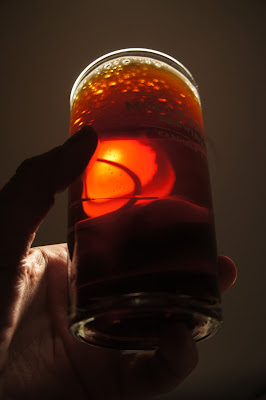 |
| A rhubarb plant. |
Rhubarb is a kind of vegetable plant whose stalks are edible, and resemble tart celery. I remember my grandmother used to grow rhubarb, decades ago, and make pies with it. It's most often mixed with sugar for desserts, and so when I saw a beer with it, I had to try.
The beer itself is made in southern Sweden by Dugges Ale & Porterbryggeri, and imported / released by Stillwater Artisanal. The "Syrligt" is a 4.5% sour ale, which is a genre I haven't really explored here on the blog - but it's one that's gained popularity lately, so I figured I should perhaps investigate. Sours are a genre of beer intentionally made tart, acidic, or sour. When brewing first started, thousands of years ago, wild yeast was all that was available - and as a result of the natural variables in that wild yeast, most beers were sour to a degree. Modern brewing techniques have eliminated those variables, so we have beer as we know it. And with the surge in craft brewing around the globe, the sour style has been recreated for today's beer drinkers. Let's give this a shot.
It pours a nice orange color, with some fizziness and a slight head. It throws an interesting lemon aroma. And, as advertised, this beer is sour; mind-blowingly so. There are some sweet berry and lemon flavors throughout, with a massive tart / sour mouthfeel - kinda like those old candies, the Atomic Warheads. There are some malty and sweet flavors on the finish, and the aftertaste is very tart and lasts for a long time.
They weren't kidding when they said sour. I think this beer could have been better if it was slightly less sour, but I like how light it was (4.5%) and relatively easy drinking. I'm glad to have tried this, and I think for $4.99 for a single, it was a fun little experiment. If you like sour - give this a spin!

















